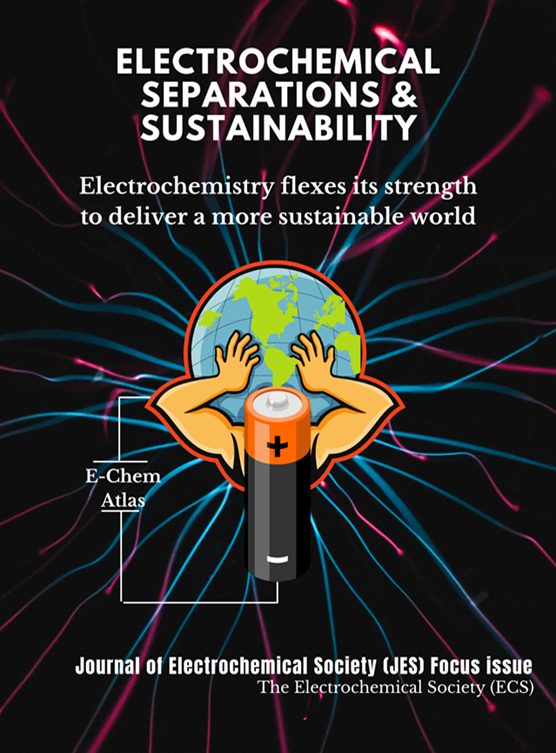Call for Papers
The Journal of The Electrochemical Society is publishing a focus issue in connection with the 240th ECS Meeting symposium on Electrochemical Separations and Sustainability 4.
Electrochemical separations can recover or harvest value products at high purity and efficiency, as well as contribute technologies for environmental management and cleanup. These innovative processes become extremely meaningful when integrated with sustainable resources and renewable energy. The current focus issue intends to address fundamental topics as well as modern applications of electrochemical separation technologies.
Electrochemical separations have received renewed attention due to growing challenges in energy, environment, and sustainability. Now the electrochemical separation has been applied in many important areas including gas purification, critical materials recovery, environmental remediation, desalination, and materials recycling. Therefore, it is great timing to have this focus issue to summarize the progress and provide perspective for the future. This topic covers from fundamental electrochemical principles behind separations, to a range of applications.
This virtual issue focuses on papers covering the following topics:
- Electrochemical separation mechanisms and fundamentals;
- Electrochemical separation modeling;
- Gas separation for ultra-pure H2, O2, CO2, etc.;
- Sea and brackish desalination technologies;
- Wastewater remediation;
- Energy materials (e.g., fuel cell and battery) recycling;
- Rare earth element recovery and harvest from mining tale;
- Valuable materials (e.g., Li) from seawater;
- Electrochemical synthesis-separation synergy;
- Integration of electrochemical separation with renewable energy;
- Other technologies relevant to electrochemical separation.
Interested authors may submit review, critical review, perspective, methods, communication, and original research articles.
Accepting Submissions: November 5, 2021 | Submission Deadline: March 21, 2022
![]()
(When submitting, indicate that the paper is intended for the Focus Issue on Electrochemical Separations and Sustainability)
Guest Editors
Hui Xu, Giner Inc., U.S. | hxu@ginerinc.com
Gerri Botte, Texas Tech University, U.S. | gerri.botte@ttu.edu
Gang Wu, University at Buffalo, The State University of New York, U.S. | gangwu@buffalo.edu;
Alice Suroviec, Berry College, U.S. | asuroviec@berry.edu
Christopher Arges, Pennsylvania State University, U.S. | cga5126@psu.edu
Xiao Su, University of Illinois, Urbana-Champaign, U.S. | x2su@illinois.edu
Technical Editor
John Harb, Brigham Young University, U.S. | john_harb@byu.edu
Associate Editor
John Staser, Ohio University, U.S. | staser@ohio.edu
Editor-in-Chief
Robert Savinell, Case Western Reserve University, U.S. | rfs2@case.edu
Articles are published in a standard issue of the journal as they are accepted. If selected at submission, accepted papers are published online in the ECS Digital Library within 24 hours of scheduling for publication. The version of record is published online within approximately 10 days of final acceptance.
Visit the ECS website for author submission instructions and requirements of each article type.
OPEN ACCESS: If open access is selected at the time of submission, authors must agree to pay an article processing charge (APC) if the paper is accepted. ECS members receive a 75 percent discount on all APCs. All discounts are applied at the time of payment. Authors from ECS Plus subscribing institutions are eligible to have APCs waived. Check if your institution subscribes to ECS Plus.



